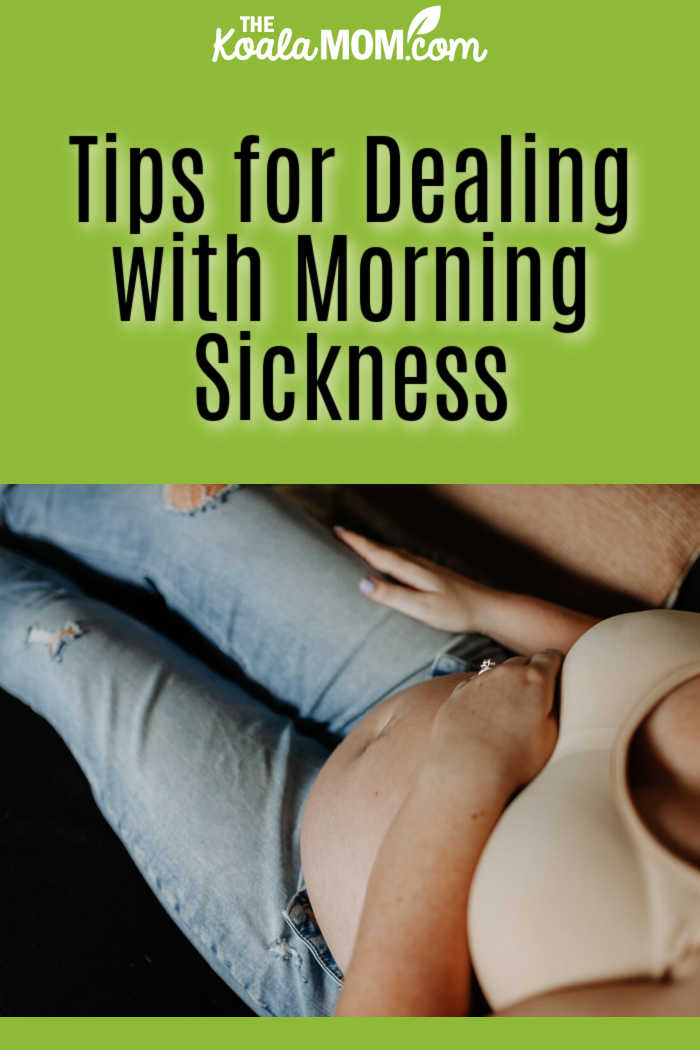Ah, morning sickness. It’s one of the most well-known, yet dreaded, pregnancy phenomena. Despite its name, it can strike at any hour of the day, with many expectant mothers finding it’s usually worse in the mornings. The reason some mothers experience more severe symptoms remains a mystery. There’s theories galore, from the weather, time of conception and diet to old wives’ tales such as the baby’s sex and position.
I like to think of it as a gentle reminder to take it easy during the first trimester and prioritize your rest and wellbeing. But take heed, while unpleasant (or unbearable for those who experience severe symptoms), there’s many mothers who’ve walked this path before you. In this article, we’ll explore some tips and insights to help ease your morning sickness, so you can focus on the joys of your impending arrival.

What is Morning Sickness?
Put simply, morning sickness refers to any bout of nausea at any stage during your pregnancy. Movies often suggest that you’ll first know you’re pregnant because you’re throwing up. However, not all pregnancies lead to morning sickness, and not all who experience it will actually throw up. For some it may just be waves of nausea.
Despite research being conducted, the reason for nausea in the first few months of pregnancy (or beyond) is still a mystery. The current theory is that it’s the result of the influx of hormones combined with lower blood pressure and a higher metabolic rate during early pregnancy.
Rest assured that whether or not you have morning sickness, there’s no evidence your baby will be affected either way. In fact, some women are reassured by their morning sickness, seeing it as a sign that their pregnancy is progressing normally. However, morning sickness can vary from woman to woman or pregnancy to pregnancy; some women have more severe morning sickness than others, and some women find that their morning sickness worsens with each successive pregnancy.
Morning sickness has been known as nature’s way of reminding you that you are pregnant and to avoid any strenuous exercise, foods, coffee or alcohol that could potentially harm your baby.
Understanding the Causes of Morning Sickness
- The severity of morning sickness can be directly related to the amount of food in your tummy from the night before. If you’ve had a meal high in protein that takes longer to digest, this can lessen symptoms, whereas if you’ve had a meal high in fat, this can make it worse.
- Activities that lower your blood pressure can also trigger morning sickness, such as getting up too quickly or having a sugar hit.
- Know your triggers. Some women are more affected by heat, certain smells (whether this be food or other odours), and low levels of vitamin B6. Vitamin B6 is what you need when you’re pregnant for your baby’s growth and development and can be obtained through eating a balanced diet, but if in doubt there are supplements too.
Practical Tips for Easing Morning Sickness
- Rest and sleep (while you can). Put your feet up and focus on one spot. Don’t read or look at your phone.
- Eat as early as possible in the day even if you’re not hungry, as it’s easier to eat when you’re not feeling sick. Having something in your stomach can help combat the nausea. Your partner can make you a high-protein breakfast to eat in bed or you can keep a granola bar near your bed to eat before getting up.
- Consume small, protein-rich meals and try to make them bland. Snack on nuts or a pot of yoghurt. More frequent, snack-like meals may help combat nausea than eating larger meals three times a day.
- Stay hydrated.
- Avoid fatty foods and those high in sugar that will give you a sugar rush.
- Avoid coffee and alcohol.
- Take supplements to boost your B6.
- Try drinking peppermint, ginger tea or soda water.
- Keep a snack in your handbag or next to your bed, such as salty crackers or nuts.
- Take a travel sickness tablet, but clear this with your doctor first.
What is Hyperemesis Gravidarum?
Hyperemesis Gravidarum refers to severe and persistent nausea and vomiting during pregnancy. Where morning sickness symptoms tend to subside at around 20 weeks, HG ramps up at around 9-12 weeks and continues until you’ve had your baby. Princess Kate has suffered from this with each of her pregnancies, requiring hospitalization to help until it passes.
HG can lead to other health problems such as dehydration, malnutrition and exhaustion, with sufferers often ending up in hospital to receive fluids. HG can be harmful to your baby so it’s imperative to speak to your health care professional if you suspect your morning sickness is reaching this level.
 Love this post? You’ll find more tips and advice like it in Beginner’s Guide to Growing Baby: Tips to Help You Through All Four Trimesters, a book about pregnancy, birth, and baby’s first three months. Written with my good friend Anna Eastland (mom of 9 kids!), Beginner’s Guide to Growing Baby is an honest, practical look at pregnancy and beyond. We share what’s worked for us in growing, birthing and loving fourteen babies.
Love this post? You’ll find more tips and advice like it in Beginner’s Guide to Growing Baby: Tips to Help You Through All Four Trimesters, a book about pregnancy, birth, and baby’s first three months. Written with my good friend Anna Eastland (mom of 9 kids!), Beginner’s Guide to Growing Baby is an honest, practical look at pregnancy and beyond. We share what’s worked for us in growing, birthing and loving fourteen babies.
Beginner’s Guide to Growing Baby is available on Amazon.
Managing Severe Morning Sickness
If you’ve already followed all the tips and tricks and you’re experiencing symptoms such as constant headaches, dark yellow urine, dehydration, and dry mouth or skin, there are medications your doctor can prescribe.
If you’ve experienced severe morning sickness in a previous pregnancy, studies show that taking a prenatal vitamin can reduce morning sickness symptoms once you conceive.

Comfort Is Key
The less restriction you have on your body, the better. Avoid tight clothes, firm jeans, shoes and underwear, especially your bra. Choose a maternity bra that is suited to the first trimester that doesn’t have an underwire of any sort. Look for one that is seamless and has the ability to stretch and move with you to accommodate the growth and tenderness in your breasts in the first trimester.
Undo your ponytail. Having your hair tightly pulled back can add to your headaches and discomfort, so wear it loose. Remember to tie it up if you’re about to puke though.
Try not to do anything strenuous such as cardio, as this can contribute to the nauseous feeling that you’re trying to avoid.
Morning sickness is one of those unpredictable aspects of pregnancy that can leave you wondering why, how, or when it will strike. If you experience it during one pregnancy, you might not have the same symptoms in another. The nausea can come in waves, varying in intensity from day to day, keeping you on your toes throughout this journey.
Many mothers and healthcare professionals recommend transitioning into maternity wear early for added comfort, along with other tips to help manage morning sickness symptoms. If you find that your nausea becomes too severe, don’t hesitate to reach out for help—support is available. Remember, you are doing your best for your growing baby, and morning sickness is a common part of pregnancy; it serves as nature’s gentle reminder to take it easy and prioritize your well-being.
 Katie is the proud mum of two beautiful girls and has been responsible for all the designs, style and fit at Cake Maternity for over a decade now. Katie is a nursing bra specialist and a fit, pattern and grading technician. She is passionate about breastfeeding and the many benefits it offers to both mum, baby and the environment.
Katie is the proud mum of two beautiful girls and has been responsible for all the designs, style and fit at Cake Maternity for over a decade now. Katie is a nursing bra specialist and a fit, pattern and grading technician. She is passionate about breastfeeding and the many benefits it offers to both mum, baby and the environment.
She is determined to make the breastfeeding journey a comfortable, supportive and beautiful one for all mums, understanding that it doesn’t always come easy to everyone. That’s why she has made it her mission to empower women as they mindfully navigate the world of motherhood and help make breastfeeding easier, through experience-driven innovation.

No Responses Yet